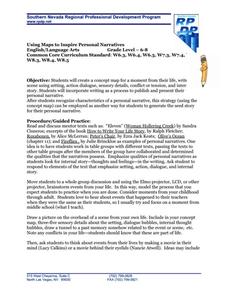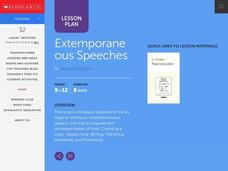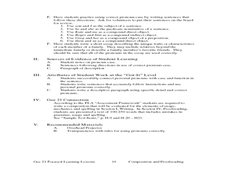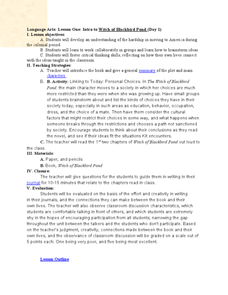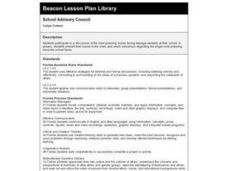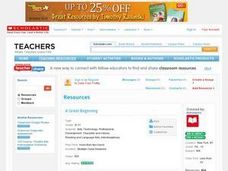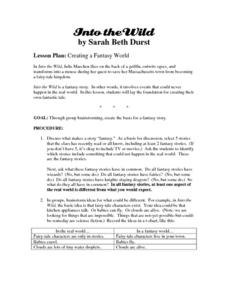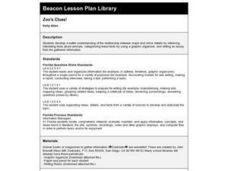Museum of Tolerance
My Experience with Injustice
As part of their preparation for a visit to the Museum of Tolerance, individuals are asked to write about a time when they witnessed or experienced unjust, biased, or prejudicial treatment. A great way for writers to make a personal...
Peace Corps
Celebrating Our Connections Through Water
Water is vital for survival, but how does it help global cultures flourish? Elementary and middle schoolers learn about the different cultures around the world that celebrate water and incorporate it into their festivals or traditions.
Curated OER
Making Connection, Using Metaphor
Chief Seatle's "Letter to President Pierce, 1855" provides the text for a skills exercise that asks readers to consider how writers use metaphors to contribute to the meaning and impact of a work. Participants then apply what they have...
Southern Nevada Regional Professional Development Program
Using Maps to Inspire Personal Narratives
A solid description of one way to teach narrative writing, this resource outlines the writing process from concept to completion. Class members create concept maps of moments in their lives and follow the writing process to publish their...
Curated OER
Extemporaneous Speeches
Students perform the six steps of writing an extemporaneous speech including, choosing a topic, researching, writing, practicing delivering and processing.
Curated OER
Write It, Read It, Solve It
Writers create an original mystery and have a chance to put it into movie format. The classic elements of a mystery must be present: the crime, the suspects, the motive, the solution and clues. Use iPhoto and Quicktime Movie to integrate...
Curated OER
Using Personal Pronouns Correctly
Complete personal pronoun practice activities. Pupils use correct personal pronoun form in sentences the teacher writes on the board. They review the function of a pronoun and the various cases and practice placing personal pronouns by...
Curated OER
Listen To What I Found Out
In this research lesson, students complete a graphic organizer to help them organize their thoughts about a research topic. At first, students engage in a class discussion which focuses on how to frame questions, establish a topic, and...
Curated OER
Cultural Inquiry Lesson 2B: Finding Artifacts and Analysis
Students build on their knowledge of sources, by looking at 2 types of information sources: artifacts or primary sources and analysis or secondary sources. They brainstorm a list of primary and secondary sources connected to one of...
Curated OER
A Classroom Coin
Students examine coins and find symbols that were selected for the country. They discuss the eagle as a symbol of the United States. They develop a list of characteristics of their class and design a coin that embodies these qualities.
Curated OER
Introducing the Narrative Account Web Page
Students complete a narrative writing assignment by critiquing a sample webpage. In this narrative writing lesson, students view the sample webpage and take notes. Students create a similar webpage that contains a narrative account based...
Orange County Department of Education
Black Cowboy, Wild Horses
Fifth graders read the selection Black Cowboy, Wild Horses and identify characteristics of self-discipline shown by story's main character, Bob Lemmons. Students then identify some of their own traits of self-discipline and reflect upon...
Curated OER
President Obama's Address to Students Across America
Learners write about goals, responsibility, and persistence, and listen to President Obama's speech. In this President Obama lesson students create concept webs, listen with a purpose, and list the challenges of our generation.
Curated OER
Stop Motion Animation
Students list steps in making Stop-Motion animation. For this stop motion animation lesson plan, students will use video equipment to come up with props, characters, backdrops, and storyboards to create a video. They then present the...
Curated OER
Intro to Witch on Blackbird Pond
Fourth graders read Witch on Blackbird Pond and understand the difficulties of traveling to America during the colonial period. In this Witch on Blackbird Pond lesson, 4th graders compare the choices we have in traveling to America...
Curated OER
School Advisory Council
Students discuss issues facing teenage students at their school.
Curated OER
Exploring Philanthropic Motivations
Students understand the reasons people give to those less fortune. In this philanthropic lesson, students read Passing the Dream by Penny Caldwell. Students respond to the poem by making a list of things they would like to change...
Curated OER
Charlotte's Web
Fourth graders focus on fluency by reading the book Charlotte's Web. In this reading strategies lesson plan, 4th graders partner read, do guided reading, and independent reading to increase fluency. Students use Venn Diagrams, discuss...
Curated OER
A Great Beginning
Young scholars create tri-fold biographical brochures. Each of the sections of the brochure refers to either the past, present or future of the student. They use the back of the brochure to list ways to be successful in high school and...
Curated OER
Creating a Fantasy World
Students create the basis for a fantasy story. They discuss what makes a story "fantasy" and identify which stories include something that could not happen in the real world. They determine what these fantasy stories have in common.
Curated OER
Driving the Digital Highway
Young scholars research a specific type of innovative computer technology in automobiles or other commonplace products or services and create a radio advertisement 'selling' this innovation.
Curated OER
Zoo's Clues!
Students determine the difference between major and minor details after researching animals and completing graphic organizers. They write descriptive paragraphs for classmates to guess what animal is being described.
Curated OER
What's the Scoop on Slang?
Students examine examples of sports jargon by reading sports articles from a newspaper. They write a news article about a fictional sports event using examples of sports jargon.
Curated OER
The Rest of the Story
Third graders make predictions about the story "The True Story of the Three Little Pigs" based on background knowledge. They read the story, stopping to verify or reject predictions. They write their own opinionated fairytales.





